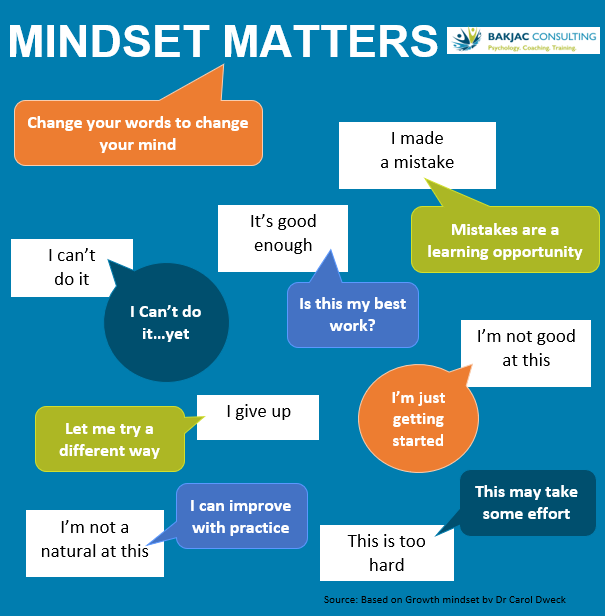There is no doubt that we are all facing a significant amount of challenges at this moment. Many of us are working in isolation, we are practising social distancing, we are trying desperately to learn new things and adapt very quickly and not only that…we have no toilet paper.
When embracing the challenges that life often throws our way, we need to consider what mindset we are firmly entrenched in. Do we believe in our ability to grow and change or do we believe we have fixed characteristics and adapatability? Do we have a fixed or a growth mindset?
A growth mindset is “the understanding that abilities and understanding can be developed” Those with a growth mindset believe that they can get smarter, more intelligent, and more talented through putting in time and effort.
On the flipside, a fixed mindset is one that assumes abilities and understanding are relatively fixed. Those with a fixed mindset may not believe that intelligence can be enhanced, or typically believe that you either “have it or you don’t” when it comes to abilities and talents.
What’s the Main Difference?
The main difference between the two mindsets is the belief in the permanence of ability; one views it as very permanent, with little to no room for change in either direction, while the other views it as more changeable, with opportunities for improvement.
We can see examples of a fixed and a growth mindset every day. Consider going into a meeting with your boss and you receive negative feedback. Your boss thinks you aren’t putting in enough effort, or you’re making too many mistakes, or that you’re simply not competent enough to handle your current project. Someone with a fixed mindset may decide that their boss has no idea what she’s talking about and completely ignore the feedback. Alternatively, they might agree with their boss and think “I just can’t do anything right. I don’t have what it takes to be successful.”
A growth mindset response would be to seriously consider this feedback, evaluate it as objectively as possible, and seek out more information and/or another opinion to compare. If your boss has a point, you would come up with possible solutions to improve your performance and do your best to implement them.
Think about right now and the current challenges in front of us. What if you are asked to adapt quickly, work from home for the first time or deliver on a project you have never tried before?
What are you saying to yourself right now - “I’m not good at this kind of stuff”, “It’s just not my strong suit!”, “I haven’t got the skills to complete this” or “When will this end?”
You might be right that it’s not one of your strengths, but that doesn’t mean you can’t learn it and try something different. A fixed mindset will take these self-defeating thoughts and run with them, concluding that there’s no point in putting all that much effort into something that just isn’t typical skill set.
On the other hand, a growth mindset will see this new challenge as an opportunity to grow and learn new things. Someone with this mindset might think, “I can figure this out”, “What do I need to do to get my skills at the right level?”, “Are there webinars or online learning I can do?”, “Who can I ask for help?” or “Are there other resources that might help me?”
The growth mindset will lead you to new skills, new knowledge, and new areas of expertise, while the fixed mindset will leave you just about where you started—with little skill in the task at hand and little confidence in your abilities.
How Can I Change or Manage My Mindset?
Consider these 8 opportunities to develop the foundation of a growth mindset:
1. Create a new compelling belief: a belief in yourself, in your own skills and abilities, and in your capacity for positive change.
2. View failure in a different light: see failure as an opportunity to learn from your experiences and apply what you have learned next time around.
3. Cultivate your self-awareness: work on becoming more aware of your talents, strengths, and weaknesses; gather feedback from those who know you best and put it together for a comprehensive view of yourself.
4. Be curious and commit to lifelong learning: try to adopt the attitude of a child, looking at the world around you with awe and wonderment; ask questions and truly listen to the answers.
5. Get friendly with challenges: know that if you mean to accomplish anything worthwhile, you will face many challenges on your journey; prepare yourself for facing these challenges, and for failing sometimes.
6. Do what you love and love what you do: it’s much easier to succeed when you are passionate about what you’re doing; whether you cultivate love for what you already do or focus on doing what you already love, developing passion is important.
7. Be tenacious: it takes a lot of hard work to succeed, but it takes even more than working hard—you must be tenacious, weathering obstacles and getting back up after each time you fall.
8. Inspire and be inspired by others: it can be tempting to envy others when they succeed, especially if they go farther than you, but it will not help you to succeed; commit to being an inspiration to others and use the success of others to get inspiration as well.
Want to know more about developing a growth mindset? Contact me to discuss coaching to assist you on this journey at michelle@bakjacconsulting.com
Michelle Bakjac is an experienced Psychologist, Organisational Consultant, Coach, Speaker and Facilitator. As Director of Bakjac Consulting, she is a credentialed Coach with the International Coach Federation (ICF) and a member of Mental Toughness Partners and an MTQ48 accredited Mental Toughness practitioner. Michelle assists individuals and organisations to develop their Mental Toughness and mindset to improve performance, leadership, behaviour and wellbeing.
































